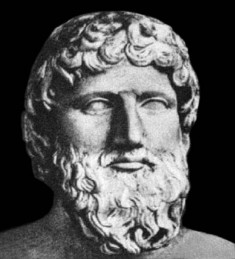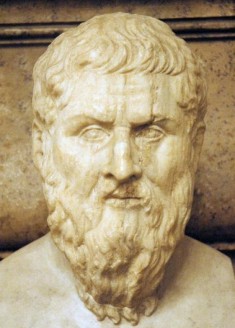| Plato | |
|---|---|
 |
|
| Classical Philosopher | |
| Specialty | Western philosophy, science |
| Born | c. 428–427 or 424/423 BC Athens |
| Died | c. 348–347 BC (at age c. 80) Athens |
| Nationality | Greek |
Plato, along with Socrates, who was his teacher and mentor, remains one of the most influential of all Greek philosophers of antiquity. His school of thought continues to influence people many thousands of years after his passing. Plato was also instrumental in founding the Academy in Athens, which was the very first institution of higher learning ever established in the Western World.
Early Life of Plato
Plato was born sometime between 428 and 427 B.C. As is common among many of the great philosophers of his day, records about the birth and early life of Plato do not exist. They were either never recorded or they were lost or destroyed. Based on what is known about his early life, certain fragments can be compiled to craft a logical biography. In terms of where he was born, it is accepted he may have been born in Aegina, although there is no certainty to this assessment.
As a young man, Plato showed a high level of scholastic aptitude. In addition to the common studies a young man would be engaged in, Plato was also heavily involved with athletics and he did show a lot of skill in physical endeavors. It is believed he had taken part in the Isthmian games as well.
Meeting Socrates
Plato eventually began his study of philosophy and he did so long in advance of meeting Socrates. However, when he did become a student of Socrates, Plato’s life changed immensely. To great dismay, historians have never been able to actually ascertain the full relationship between Socrates and Plato.
How close the two became is not really known, although it is clear Plato was heavily influenced by Socrates to the point it is reasonable to conclude Socrates was his mentor. Plato also went on to document the trial of Socrates.
Socrates’ Influence on Plato
 In his works, Plato often wrote from the perspective and voice of Socrates. This can sometimes create a bit of confusion over where the theories of Plato and Socrates begin and end. It would not be an outrageous assumption to infer that whatever sentiments expressed in a work authored by Plato are surely those themes and beliefs he strongly adhered to.
In his works, Plato often wrote from the perspective and voice of Socrates. This can sometimes create a bit of confusion over where the theories of Plato and Socrates begin and end. It would not be an outrageous assumption to infer that whatever sentiments expressed in a work authored by Plato are surely those themes and beliefs he strongly adhered to.
One of the more interesting aspects of Plato’s work is how he examined the relationship between a father and son and how it relates to the overall strong structure and foundation of society. In short, Plato believed the role a father played in terms of shaping the life of his son contributed greatly to how the young one turned out. A young man who was properly cared for as a youth would be more likely to grow up and be a responsible member of society.
Plato also is credited with creating theories surrounding Platonic realism, a philosophical examination of realism in regard to the existence of universals and seemingly abstract objects.
The theory of forms is another concept that is attributed to Plato. Within this theory, the notion is put forth that the belief in the real world is based solely on an image of the real world, and not what is actual reality.
Major Works of Plato
The Republic was the premiere major work of Plato and it is an expansive and influential presentation of a Socratic dialogue. The work examined the idea of justice from the perspective of the just man in relation to the just society. The more controversial aspect of the work is its suggestion that society might be best constructed when philosopher kings rule over society and make the decisions on behalf of the populace. This is a statist concept that is removed from the works of Enlightenment era philosophers, such as John Locke.
The other critical work that he compiled was the Socratic Dialogues, a treatise that examined virtue and asked poignant questions about whether or not it was possible to teach virtue. Other major works of Plato include Phaedo, Symposium, Parmenides, and more.
Last Days of Plato
Plato traveled quite a bit in his later age. He did get involved with some controversies in Syracuse as he interjected himself into the political turmoil in the region. His passing is surrounded by a bit of legend, although it is accepted he died in his sleep circa 348 B.C. in Athens.